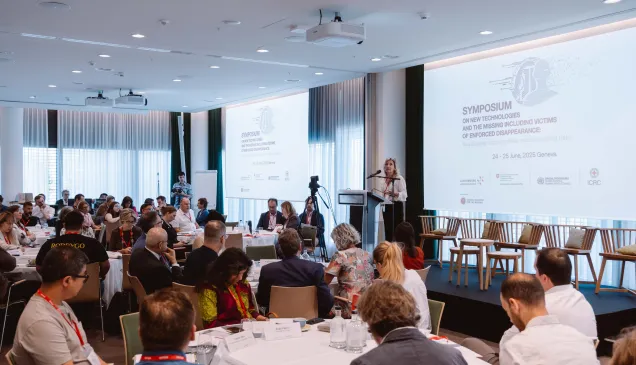ICRC President: Why are we failing to reduce the terrible suffering caused by sexual violence in conflict?
Opening address at the event on Sexual Violence Against Migrants: A Time for Action
Thank you for the opportunity to address you on the issue of sexual violence and migration.
Sexual violence is an appalling crime. This is not up for a debate.
Some may consider it to be an inevitable by-product of the cruelty and chaos of war, violence and instability.
But it is not inevitable, quite the contrary, it is never committed by accident. People do not rape by accident.
While there are many possible motivations for committing sexual violence, it is often done with an intent to break or de-humanize people and to inflict the greatest possible harm. And it is most often rooted in underlying gender norms.
Whether wielded against women, men, boys or girls, sexual violence is always an expression of unequal power relations.
Migrants are especially left vulnerable – they may not be familiar with the country they are in, they may lack social networks and find themselves in situations of power imbalance.
Sexual violence can create ongoing harm and suffering to a survivor long after the initial violation has taken place – whether through the stigma imposed by society, inaccessibility of services or inadequate domestic legal norms.
Let's be very frank here: in some of my discussions on the most adequate response to sexual violence in our operations, I am confronted with allegations that this is a donor-driven issue, and thus not really of concern to war-torn societies.
Or that in this or that context, sexual violence does not really exist;
Or that is not really relevant because of specific cultural and political circumstances.
In that sense, I was interested to see the statistics coming out of 54 community workshops between 2015 and 2018 on major problems experienced: Sexual violence was the number one concern for young women. Others named it among their major fears: alongside community tensions, economic insecurity, displacement and looting.
Recently I was participating in conversation at the WEF with a selection of foundations and companies on "value creation in fragile contexts". The two largest threats to successful projects were corruption and sexual violence, in partbecause of the strategic importance of women in productive economic development and building resilience.
My point here is: we are challenged within our own ranks in developing substantial and forward-looking responses. We are having to keep making the point and offer proof that the problem exists as well as how it can be addressed.
But this is not news to anyone here today. And I am sure I am not alone in asking why, despite the best of intentions, are we failing to substantially reduce the terrible harm and suffering caused by sexual violence in conflict?
We know that this is sensitive issue and often considered taboo. But could it also be that we over-interpret the taboo? And if there is taboo, is it with the humanitarians or with affected persons?
Do we conceptually disempower ourselves by mentioning all the complexities of the issue without showing the way to undertake concrete steps?
Is it because we are too cautious in taking preventative steps to address the issues with arms bearers?
Or are we not able to create the environment, in which a survivor would feel comfortable speaking about traumatic events? And trust us with their deeply personal information?
Or is the topic so closely linked to broader issues of gender and power that we will not advance unless we make progress on both fronts?
Or is it because unfortunately justice and accountability seem so elusive all too often?
I know the complexities are deep. While I don't have the answers to all these questions, I would like to invite an honest reflection and encourage you to take tangible actions.
I also want to restate the ICRC's commitment to addressing sexual violence in our operations as one of our priorities in our new institutional strategy.
This also means that we have to shift gear from a discussion on "what to do to" to one on "how to do it".
We are committed to keep working every day to prevent sexual violence through dialogue with parties to the conflict, state authorities and other stakeholders, working on better implementation of legal norms, reducing risk through our protection and assistance programs and providing care and assistance to survivors.
But I am still looking for some very specific and concrete steps in order to get to measurable impact.
For the time being, we are certainly not at speed and scale and maybe not even at consensus what exactly needs to be done.
We can't speak about the efforts of humanitarian organizations without mentioning that it is national authorities that bear the primary responsibility to prevent sexual violence and to ensure victims receive care and justice.
International humanitarian law and international human rights law are clear: rape and other forms of sexual violence are a violation.
There are many steps that state authorities can take to ensure protections, including for migrants. For instance, they can ensure:
- Adequate protections in their legal frameworks and policies – ensuring protection for all, including migrants, in particular those at risk such as unaccompanied children, irregular migrants or migrants in camps or detention;
- They can make sure that institutions, such as prisons, and state authorities are organized and trained according to the highest standards, and can address the protection needs of victims of sexual violence; and
- They can ensure that medical needs – both physical as well as psychological are met and obstacles to access services removed.
The ICRC is ready to support this work and to help authorities find solutions.
Dear colleagues
There are obligations for states, but as long as sexual violence remains prevalent we too have a role to play.
Now is the time to be open, to address the barriers, to bring new solutions, and work towards a substantive reduction in sexual violence.
Opening address at the event on Sexual Violence Against Migrants: A Time for Action, 10 September 2018, Geneva.



